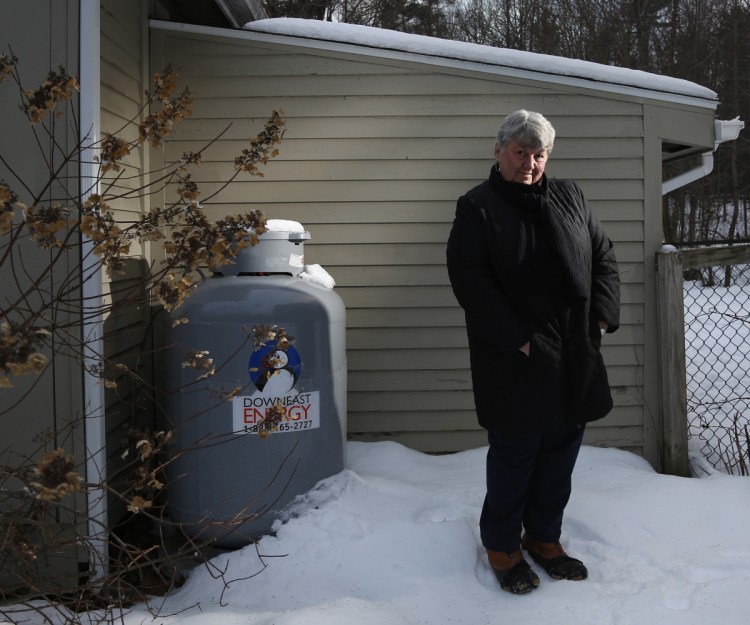A new charge called a hazmat fee has started to appear on the bills of Downeast Energy customers, prompting complaints.
Pamela Smith of North Yarmouth noted it on her bill after she got a propane delivery this winter. She was charged $188 for the fuel and $11.62 for a hazmat fee.
Her propane dealer, Downeast Energy, sent notices to many of its customers in late December, saying it was instituting the fee to offset “a portion of the costs related to government-mandated compliance processes for the handling of hazardous materials, workplace safety, emergency preparedness and environmental protection.”
The notice included a line noting that the fee is not mandated by the local, state or federal governments and it isn’t collected on behalf of, or sent to, the government.
Smith said the amount of the fee didn’t shock her, but the fact that the company was adding it on as a separate charge to her propane bill left her “flabbergasted.”
“A ‘hazmat fee’ every time there’s fill-up?” she said. “They’re very nice people, but I was just taken aback by this additional fee.” The fees are a growing phenomenon, said Jamie Py, president and chief executive officer of the Maine Energy Marketers Association. So far, Py said, “I haven’t seen a lot of it in the Maine market” but he expects it to become more common as national fuel dealers add it to bills for their customers.
Py said as national propane dealers attach the fees, their local subsidiaries and competitors are likely to follow suit. Py said he did not know how many fuel companies in Maine are adding the fees to their bills, but that it seemed to still be “uncommon” in Maine, while showing up on the national level.

North Yarmouth resident Pamela Smith was charged nearly $12 by her propane service for a hazmat fee, although there’s no such thing under local, state or federal law. “A ‘hazmat fee,’ every time there’s a fill-up? They’re very nice people, but I was just taken aback.”
Downeast Energy is following the instructions of its corporate parent, Superior Plus, said Chris Kowalski, marketing manager of Osterman Gas, another Superior Plus company that’s based in Massachusetts.
Kowalski said the fee covers companies’ “investment” in driver and technician training, the cost of meeting government rules, providing up-to-date safety equipment and tools for employees, and adhering to environmental regulations.
“The hazmat fee is a transparent way to show our customers the portion of their total expenditure that is invested back into safety,” Kowalski said in an emailed statement. When Downeast was sold in 2012, it reported 50,000 customers in Maine and New Hampshire, and Kowalski did not respond to a question about how many customers Downeast has now in Maine.
Kowalski also did not directly answer a follow-up question asking if Downeast Energy adjusted its propane prices after separating out the hazmat fee.
“The price that our customers pay per gallon fluctuates constantly based on commodity prices, wages and delivery costs among other factors; however, with this approach, the hazmat fee is defined,” he responded.
According to the Governor’s Energy Office, the statewide average for propane was $2.87 a gallon as of Jan. 14 and the statewide average for heating oil was $2.89 a gallon.
Kowalski said Downeast’s fee will be charged “across all fuel types that we deliver.” The company also sells heating oil.
Dead River Co., another major fuel dealer in Maine, hasn’t instituted any hazmat or similar fees on residential customers, a spokeswoman said.
Lisa Smith, who runs the Governor’s Energy Office, said some propane customers contacted her in years past about a hazmat fee on their bill and she’s getting more inquiries this year, including some from heating oil customers. Because the market is largely unregulated, she doesn’t log the complaints but offers advice on how to become a wise consumer of fuel. The office’s website, for instance, offers tips on buying fuel, safety and saving money.
Smith said she also tells those who contact her that they should feel free to question the bills they get.
And she said she tells those asking about the fee, “If you don’t like the price, here’s how you go elsewhere.”
That’s relatively simple advice for people who use heating oil or kerosene, she said, but more difficult for propane customers. Propane is usually priced based on the volume bought over the course of a year. In addition, propane tanks are owned by the fuel companies, not the customer. So changing a supplier, unlike in the heating oil market, can be a time-consuming and expensive proposition involving more than just comparing prices.
Smith said state law mandates that propane companies can only fill the tanks they own. Switch dealers and you need to have the old tank replaced by the new supplier, she said.
And that can affect other prices, such as whether the fuel company will charge a monthly fee for the tank. Smith said customers who use a lot of fuel often can avoid those charges, while those who use less are likely to have a fee added to their bill.
Edward D. Murphy can be contacted at 791-6465 or at:
emurphy@pressherald.com
Copy the Story LinkSend questions/comments to the editors.




Success. Please wait for the page to reload. If the page does not reload within 5 seconds, please refresh the page.
Enter your email and password to access comments.
Hi, to comment on stories you must . This profile is in addition to your subscription and website login.
Already have a commenting profile? .
Invalid username/password.
Please check your email to confirm and complete your registration.
Only subscribers are eligible to post comments. Please subscribe or login first for digital access. Here’s why.
Use the form below to reset your password. When you've submitted your account email, we will send an email with a reset code.